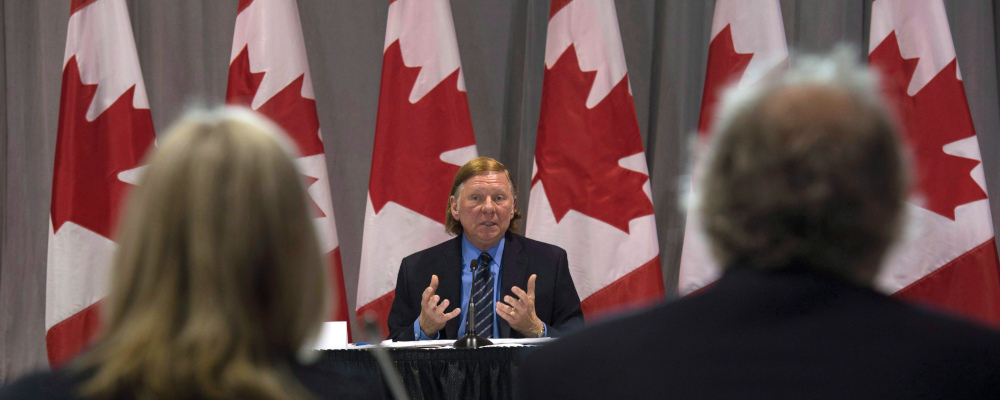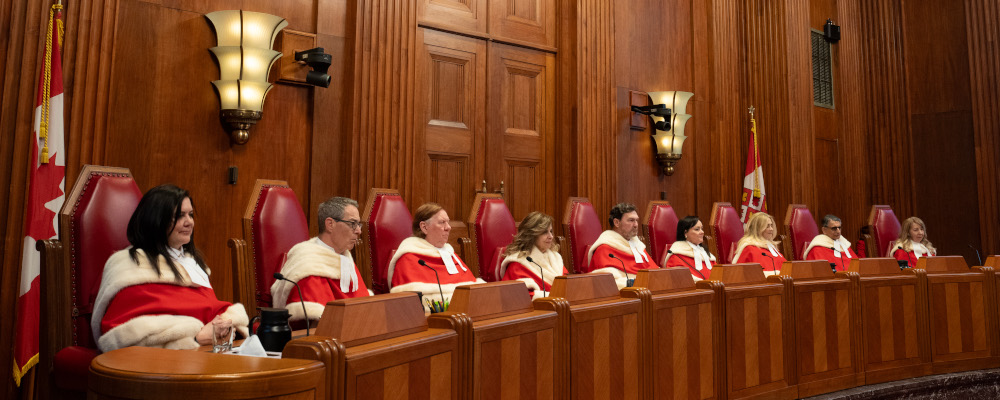On January 10, 2024, Canada lost a giant in the field of political science, Peter Russell, a longtime professor at the University of Toronto. His illustrious academic career left an enduring mark on my discipline that will be felt for decades to come. Apart from his widely renowned written contributions, Russell helped initiate the growth of a robust and wide-ranging study of Canadian judicial institutions through the many students he supervised. Two of them, Ted Morton and Rainer Knopff, ended up playing leading roles in diversifying the discipline of judicial politics.
Twenty-four years ago, Morton and Knopff published The Charter Revolution and the Court Party, a now classic work in Canadian political science that makes the case that the Supreme Court of Canada has become a forum for left-wing interest groups to achieve policy ends that they could not accomplish legislatively. A testament to the incisiveness of its heterodox analysis, it is still assigned in graduate-level reading lists.
Morton and Knopff were part of a broader intellectual movement of Canadian conservative scholarship. These scholars, including also Tom Flanagan, David Bercuson, and Barry Cooper, became known as members of the Calgary School, a loose association of mostly political scientists who, informed by the theories of Friedrich Hayek, Eric Voegelin, Walter Berns, and Leo Strauss, promoted conservative political thought. Alongside Christopher Manfredi, a professor at McGill University, they produced a long list of scholarship that scrutinized some of the most sacred cows of Canadian political life, including the Charter, Quebec’s place in the federation, and Indigenous reconciliation.
In the area of judicial politics, Knopff, Morton, and Manfredi, joined by Thomas Bateman of St. Thomas University and another one of Russell’s PhD disciples, Janet Hiebert of Queen’s University, argued in a series of books and articles that the Supreme Court was excessively activist, expanding rights and freedoms beyond a reasonable interpretation of the text or the original intentions of the Charter’s framers. This activism was a cause and effect of the increasing tendency for special interests to frame political discourse in the language of rights. The courts, accepting this conceptual slippage from politics to law, removed vast areas of policy space from democratic deliberation.
To members of the Calgary School and other skeptics of judicial review, this judicialization corroded the health of Canadian democracy. It meant fundamental issues like abortion, gay rights, sex work, criminal justice, and religious liberty were decided by nine unelected judges rather than the Canadian people acting through their representatives in Parliament.
The Calgary School’s influence reached far beyond the confines of the ivory tower. Morton was elected as Alberta’s “senator-in-waiting” and later became an Alberta MLA. He subsequently took on several ministerial portfolios and unsuccessfully contested the 2006 and 2011 provincial Progressive Conservative leadership races. Flanagan helped develop the nascent Reform Party into an electorally viable political party during the 1990s. Stephen Harper, the man who would one day become prime minister, was also his protégé. Co-authoring with Harper an influential opinion piece that decried the state of Canadian conservatism and the dominance of the Liberals during the 1990s, Flanagan also managed his campaigns to become the leader of the Canadian Alliance and then the reunited Conservative Party. More recently, Cooper caused a stir by contributing to the 2021 Free Alberta Strategy, a policy declaration that proposed an Alberta Sovereignty Act and the transfer of jurisdiction to the provincial government. True to form, these conservative intellectuals valued practical experience as much as theoretical understanding.
From this first wave came a younger generation of scholars centred in the University of Guelph who have taken up the mantle of conservative legal scholarship. Morton and Knopff’s students, Mark Harding, Dave Snow, Ian Brodie, and Dennis Baker have continued the legacy of their mentors alongside Troy Riddell, chair of Guelph’s political science department who studied under Manfredi, and Geoff Sigalet of UBC Okanagan.
With greater comparative awareness and more rigorous methodologies, this second cohort has contributed to debates over constitutional exchanges between legislatures, executives, and courts, the role of Parliament in preserving rights, criminal justice policies, and the notwithstanding clause. For example, by comparing the strength and reach of rights documents in Canada, New Zealand, and the United Kingdom, Harding’s book Judicializing Everything? assesses the extent to which constitutional values have penetrated public and private law. The overarching theme of this body of work has been to push back against assertions that courts are the final, sole interpreters of constitutional meaning.
Like their predecessors, this influence extends into politics as well. Ian Brodie was chief of staff in the Harper government from 2006 to 2008, executive director of the Conservative Party, and most recently the chair of the party’s Leadership Election Organizing Committee during the 2022 leadership race. After his stint in politics, Brodie published a book that, based on his experience at the centre of government, challenges the longstanding centralization thesis which argues that the prime minister, by expanding the power of the Prime Minister’s Office and the Privy Council Office, has aggrandized his executive authority at the expense of Canadian democracy. It bears mentioning that another one of Flanagan’s scions, Danielle Smith, is currently the premier of Alberta.
This says nothing about the movement’s countless other students who went on to successful careers in public policy, academia, and advocacy. For example, Manfredi also tutored a variety of now prominent voices in Canadian judicial politics like Sigalet, Riddell, Kate Puddister, James Kelly, Emmanuelle Richez, Erin Crandall, and Matthew Hennigar.
So impactful have these children of the Calgary School been on Canadian political life, that Justice Malcolm Rowe, in his recent 2024 Runnymede Society keynote lecture, credited them for ushering in a Guelph School of legal analysis, the spiritual successor to the Calgary School. In his speech, Justice Rowe also argued forcefully that the realist analysis of the law by political scientists like Dave Snow, Mark Harding, and Peter Russell has often been more clear-sighted than the work of his fellow jurists and law professors. Composed of just a handful of individuals, the Calgary and now Guelph Schools have pulled well above their weight in academic and real-world impact.

With eight out of its 25 faculty members specializing in law and politics, including its chair, a higher number in relative or absolute terms than any other political science department in the country, the University of Guelph is an emerging hub of research into legal studies, conservative or otherwise. Bryon Sheldrick and Jordi Díez teach about the intersection between the law and social movements, Puddister writes about criminal justice policy, and Minh Do works on Indigenous judicial politics.
Ironically, while conservative political scientists generally caution judicial restraint, many of their counterparts in the legal profession such as the Canadian Constitution Foundation are fighting in the courts to strike down the Trudeau government’s laws on the basis of constitutional rights and jurisdictional overreach. They have done so successfully in cases like Canadian Frontline Nurses v. Canada (Attorney General), where the Federal Court ruled the use of the Emergencies Act unlawful, Reference re Impact Assessment Act, which found that environmental assessments of resource projects were outside Parliament’s legislative authority, and the Toronto Council v. Ontario decision finding that it was constitutional for the Ford government to shrink the size of Toronto City Council. It seems Morton and Knopff’s “Charter Revolution” has come full circle.
Moreover, the Runnymede Society, a budding association of lawyers, professors, and students promises to disrupt the legal landscape in Canada just as the Federalist Society has done so successfully in the United States. With student chapters at all major law schools and speeches by three Supreme Court Justices, the Runnymede Society has a fighting chance of unsettling Canada’s legal orthodoxy.
The larger point is that although much of the social sciences and humanities remain politically segregated with scholarship heavily skewed towards favouring a progressive ideological monoculture, this is not the case in the subfield of Canadian judicial politics. There you will find just as many critics of the judicialization of Canadian politics as supporters. Important debates continue to take place over whether the Supreme Court’s jurisprudence favours the federal or provincial governments, how and why judges decide as they do, whether the courts and the legislature participate in a dialogue over the meaning of constitutional rights, and, most fundamentally, the appropriate role of courts and legislatures in a liberal democracy. The ideological orientation of participants spans the gamut, from critical legal theorists to straightedge positivists to conservative skeptics. There might have been more left-wing critics of judicial supremacy in the past but there still are some.
We have the inheritance of intrepid academics like Knopff, Morton, Manfredi, the recently retired Janet Hiebert, and most of all, the late Peter Russell to thank for the strength and diversity of Canadian judicial politics scholarship today. Regardless of one’s political orientation—Russell after all, identified as non-partisan—that subfield’s intellectual pluralism is an achievement worth celebrating.





